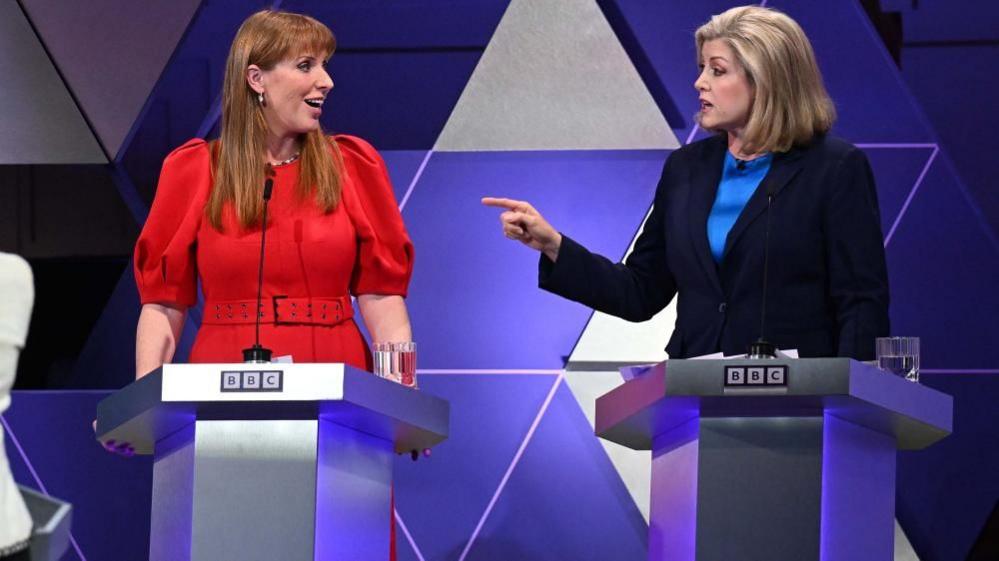Heated clash on tax and defence in BBC election debate

- Published
Tory Minister Penny Mordaunt and Labour's deputy leader Angela Rayner repeatedly clashed on defence and tax in a fiery seven party BBC election debate.
Ms Mordaunt repeated the controversial claim that Labour wanted to increase tax by £2,000 per household, which Ms Rayner described as "a lie".
The UK statistics watchdog criticised the Conservatives' use of the £2,000 figure, claiming it risked "misleading" people.
Immigration was another flashpoint in the 90-minute debate, with Reform UK’s Nigel Farage coming under fire from the SNP, Lib Dems, Greens and Plaid Cymru.
The debate gave the smaller parties a chance to grab the spotlight following Monday’s head-to-head clash between Rishi Sunak and Keir Starmer, which was also dominated by tax claims.

It came after what is being seen as the biggest blunder of the election campaign so far, as Rishi Sunak was forced to apologise for leaving D-Day 80th anniversary events early.
Penny Mordaunt came under immediate attack over the PM’s decision, which she said was "completely wrong".
Ms Mordaunt, a Navy reservist, said it was right that Mr Sunak apologised to veterans and the public but warned it should not become "a political football".
Unlike other Conservatives, Ms Mordaunt did not use the opportunity to praise Mr Sunak's record on veterans and defence.
Lib Dem Deputy leader Daisy Cooper said Mr Sunak's actions were "politically shameful", while Mr Farage called his early departure a "complete and utter disgrace" from an "unpatriotic prime minster".
Ms Mordaunt launched an attack on Labour’s defence policies.
Mordaunt and Rayner clash over nuclear deterrent funding
She criticised Ms Rayner – who was stood next to her thanks to the random ballot to select positions on stage – for her past votes against renewing the Trident nuclear weapons programme.
The Commons leader said this meant adversaries like Russian President Vladimir Putin would doubt Labour's willingness to use nuclear arms, adding: "Without credibility, we become a target".
But Ms Rayner said Labour is absolutely clear that the UK will keep its nuclear deterrent - as set out by Labour Leader Sir Keir Starmer this week - and match the Tories plans increase defence spending to 2.5% of GDP when the economy allows.
She criticised the Conservatives for cutting the armed forces, which she said made the UK a "laughing stock internationally".
D-Day, taxes and the NHS: Moments from the BBC debate
Lib Dem deputy leader Daisy Cooper said her party was also committed to maintaining the UK's nuclear deterrent and would reverse cuts to the number of troops in the armed forces.
The Green Party, Plaid Cymru and the SNP all confirmed they opposed renewing Trident - arguing the money could be better spent on other areas of defence.
The night's biggest clashes erupted when Ms Mordaunt repeated the prime minister's claim that Labour's plans mean "£2,000 in higher taxes for every working family in our country".
“That is a lie," Ms Rayner replied adding that the government has raised taxes to a "record level".
"Penny that's rubbish and you've just said we need a strong economy - you backed Liz Truss and crashed our economy," she added.
BBC analysis found the claim was misleading. The figure was based on dubious assumptions about Labour's spending divided by working households over four years.
Elsewhere, in the debate Ms Cooper admitted the Lib Dems breaking their 2010 pledge not to raise tuition fees was still a "sore subject, for sure" for her party.
But she argued the Lib Dems "fought the Tories every day" during the coalition to lessen the impact of austerity.
The SNP’s leader at Westminster Stephen Flynn also received several rounds of applause during the night, claiming both Labour and the Conservatives would continue an "austerity agenda" due to their self-imposed rules on getting debt falling as a share of national income.
He also argued for change the tone of the debate on immigration and "too much of it is framed around the bigotry of people like Nigel Farage".
Mr Farage was attacked by the SNP, Plaid and the Greens over his immigration stance, but he insisted the "population explosion" raised housing prices and cutting migration to "net zero" would fix it.
He also appeared to say that he believed the NHS should be abolished, at least in its current form funded by general taxation - arguing French-style insurance system would get better results "for the same money".
But the Reform UK leader’s comments about the election campaign being “dull” and “very dull in the case of Labour” went down well with the audience.
And he got a round of applause for a call to crack down on knife crime with more “stop and search”.
Green co-leader Carla Denyer criticised Labour for ditching its policy to spend £28bn a year on its green investment plan.
"Tackling climate change does us so much good" both economically and environmentally, Ms Denyer argued.
Rhun ap Iorwerth, Plaid Cymru's leader, said he had seen a growing lack of trust in politics over the last 30 years, saying politicians need to be honest about taxes and improve fairness in the system.
He urged for a fairer tax system to stop people like Mr Sunak from paying less on investments than workers do on their "hard graft."